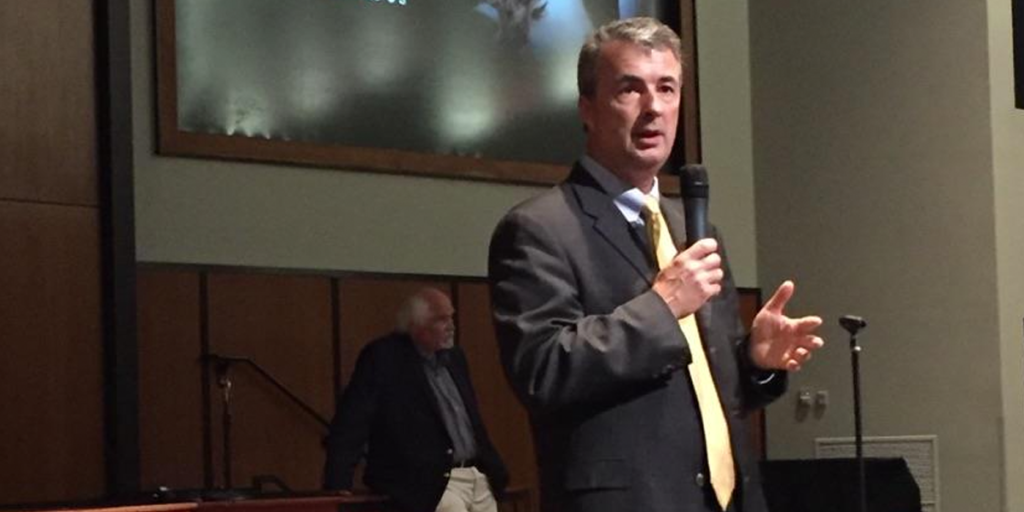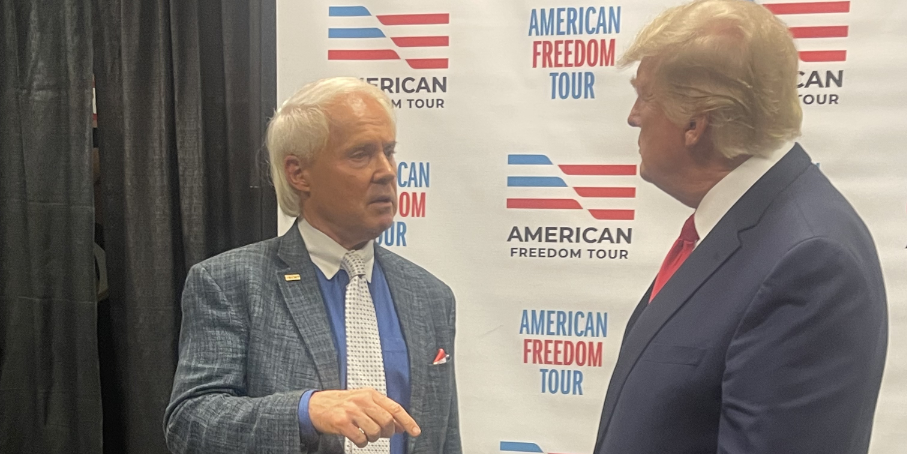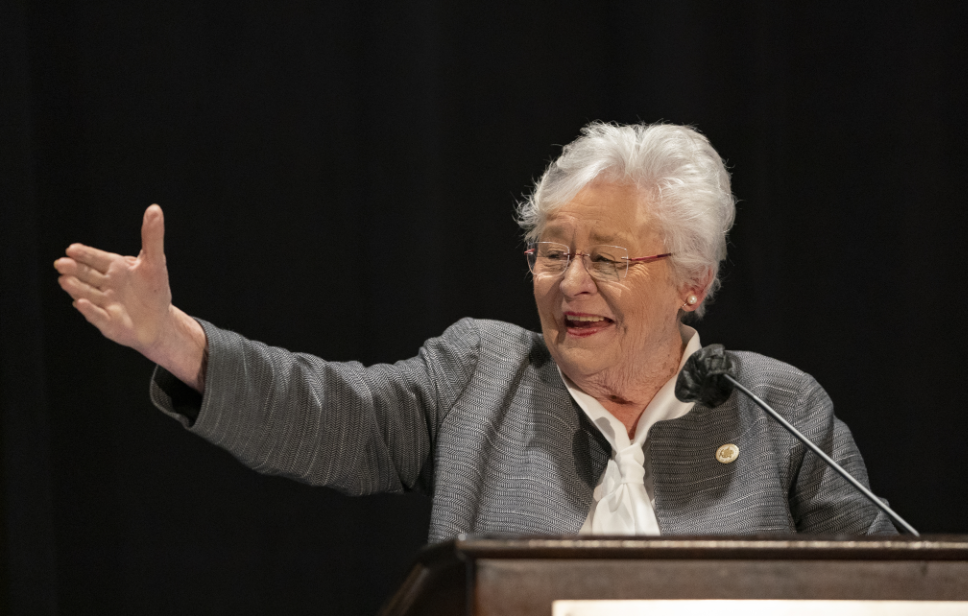Perry Hooper apologizes for “unacceptable” behavior

On Tuesday, former State Rep. Perry Hooper Jr. released a statement apologizing for what he called his “unacceptable behavior” towards Elizabeth Daly. The apology followed Judge J.R. Gaines’ acceptance of the Montgomery District Attorney’s motion to dismiss the charges against Hooper. Hooper, through his attorney, Joe Espy, sent a copy of the apology to Alabama Today. “I would like to express my sincere apologies to Elizabeth Daly. On August 16, 2022, Miss Daly was assisting my friend and me as a hostess where we were dining. I was wrong, and I take full responsibility for my actions. Miss Daly is an exemplary person, and my behavior was unacceptable. I hope she will accept this apology for my regrettable conduct.” Espy said that Hooper would have no further comment on the matter. “The State of Alabama has concluded that without the Victim’s testimony and cooperation, the evidence would be insufficient to attain a conviction,” Chief Deputy District Attorney Azzie Taylor wrote in a motion filed in Montgomery County Circuit court on Monday morning. Hooper, age 68, was indicted on sex abuse charges by a Montgomery County grand jury last month. Hooper was arrested in August after an incident at a downtown Montgomery restaurant on Commerce Street where Daly was working. Following the indictment, Daly released a statement asking that the charges against Hooper be dropped. Daly wrote in a statement released to Alabama Today, “I have asked that any charges against Perry Hooper be dismissed. The matters relating to Mr. Hooper and me have been resolved, and going through the turmoil of a trial would provide no more justice than getting a sincere public apology from Mr. Hooper. I so respect and appreciate law enforcement and the job they have to perform. Nevertheless, I request these charges be dismissed.” Daly has asked that the press respect her privacy and not contact her. Hooper is a senior member of the Alabama Republican Party Executive Committee – the 425-member committee that directs the governance of the party. He is also a member of the Board of the Alabama Music Hall of Fame. Hooper was a frequently published political commentator whose columns were frequently published at 1819 News and the Montgomery Advertiser. According to an affidavit, Hooper approached a woman (Daly) working at a restaurant from behind and allegedly grabbed her breasts and waist in an unsolicited embrace while shoving his pelvis against the victim’s backside and began kissing her neck before she was able to break free. Hooper served in the Alabama House of Representatives from 1983 to 2002. Hooper is a prominent supporter of former President Donald Trump and a frequent visitor to the Trump Whitehouse as well as Trump’s Mar-A-Lago Resort. To connect with the author of this story, or to comment, email brandonmreporter@gmail.com.
Study group urges Legislature to grow Alabama’s economy

Lieutenant Governor Will Ainsworth led a study group that on Monday recommended that for Alabama to remain economically competitive with neighboring states, the Legislature needs to reauthorize and expand the Alabama Jobs Act and Growing Alabama Act which pays economic incentives to companies that locate or expand in Alabama. The Joint Legislative Study Commission on Renewing Economic Development Incentives held its final meeting at the Alabama State House before submitting its report to the Governor and Legislature on recommendations for reauthorizing economic development incentive programs. The study committee claimed that the Alabama Jobs Act and the Growing Alabama Act are essential and recommended that these incentive programs should be reauthorized before they expire in 2023. This commission was established by the Alabama Legislature in the 2022 legislative session. It includes representation from businesses and industry and was tasked with reviewing existing economic incentives and making recommendations to the Governor and Legislature on those incentives ahead of the 2023 legislative session. Ainsworth, who chairs the commission, said that the commission’s findings will be a roadmap for the Legislature on how Alabama can best leverage incentive programs to boost the state’s economy: “Our goal is simple – we want to have the best incentives not only in the southeast but in the nation as a whole,” Ainsworth said. “This commission has been diligent in comparing our existing incentives with other states and working with the Department of Commerce to determine how we can expand both new and existing industries. Reauthorizing these programs is going to be essential in attracting high-paying, long-lasting, 21st Century jobs.” State Representative Nathaniel Ledbetter agreed, “Reauthorizing these incentives is going to help Alabamians by allowing us to compete for the best jobs in the country right here in our state. Industries across the country are trying to come here because of our great employees, our low taxes, and because of our great quality of life. We want to make sure that, from a competition standpoint, we have the tools needed to bring them here and keep them here.” Ledbetter is the Republican House Caucus’s choice to be the next Speaker of the House. Republicans have a commanding supermajority in the Alabama House of Representatives, so the Republican choice for Speaker will, in all likelihood, be the next Speaker when the full House of Representatives vote in an organizational session in January. The Study Commission held discussions with the Alabama Department of Commerce, industry professionals, and the Economic Development Partnership of Alabama to reach their conclusion that the Alabama Jobs Act and Growing Alabama Act are pivotal tools used by the state’s economic development professionals in successfully attracting businesses to the state. Senate President Pro Tempore Greg Reed said that for Alabama to compete with neighboring states, economic development incentives need to be reauthorized and expanded. “When you look at the top issues Alabamians care about, economic development and job creation are right at the top of that list,” Reed said. “States around our region are all competing with each other to attract jobs and to create economic growth, and we need to make sure that we win those competitions so good-quality jobs will come to our state and our communities. Alabama is the greatest state in the nation to live and work, and these incentives will play a key role in keeping it that way.” Senate Minority Leader Bobby Singleton also supports renewing the incentives legislation. “Growing Alabama’s economy and creating good jobs for our citizens is something we can all agree on,” Singleton said. “This commission has been thorough in studying existing incentives and exploring how they can be improved and further deployed to really capture their full potential. I thank this commission for its diligent work and look forward to seeing the impact its findings will have on communities across our state.” Alabama Commerce Secretary Greg Canfield also served on the Committee representing Alabama Governor Kay Ivey’s administration. “If you look at Alabama, we are almost a victim of our own success, is what I said in the commission meeting,” Ainsworth said in a video clip shared with the media. “We have had so much success in developing sites that we are out almost. We need to develop more sites in Alabama, and we have got to be more aggressive to make sure that we stay ahead of other states. Look at mega-sites. We need more mega-sites for companies to locate here. We have some of the lowest taxes. We have the best workers. People want to live in Alabama. Companies want to come here, so it is our job to make sure that we have sites so that they can come here and build their businesses.” Critics of economic incentives dismiss them as “corporate welfare.” At the same time, some ultra-conservatives have argued that the decision to give or not give economic incentives to businesses looking to locate or expand in Alabama is picking winners and losers and is not a function of government. To connect with the author of this story, or to comment, email brandonmreporter@gmail.com.
Steve Marshall argues, “There is no moratoriums on executions”

On Monday, Attorney General Steve Marshall told reporters in a press conference in Montgomery, “As far as I and my office are concerned, there is no moratorium (on executions), nor will there be.” Alabama Governor Kay Ivey in November asked the attorney general’s office not to schedule any more executions until a review was conducted of what went wrong in the botched execution of Kenny Smith, where the state failed to kill Smith by lethal injection. “I have not spoken with the Governor,” Marshall said. “I am not objecting to the review, but I am also saying that there is a time limit on the review.” Marshall said there was no moratorium and chastised the media for calling it a moratorium. Marshall explained that when the state obtains an order for an execution, it has to be carried out within a 24-hour period, but the Alabama Department of Corrections (ADOC) narrows that down to a six-hour window. That rule has been in place for years, long before Marshall or Ivey were in office. Marshall said that the review should be “expedited quickly.” Ivey ordered the review on November 21 after ADOC’s employees failed to find a vein to execute the murderer on November 17. “I look forward to having a conversation with the governor about this,” Marshall said. “But to me, it is a very discrete and limited investigation.” Marshall called the failed Kenny Smith execution “a travesty” because the victim’s family had waited 35 years for justice. “Almost half of Alabama’s population was not even born yet,” Marshall commented. Marshall laid the blame “at the feet of the inmates and their lawyers.” Marshall said that his attorneys were forced to respond to the “frivolous claims” of Smith’s attorneys before the Supreme Court, which took time, and that Smith resisted efforts by ADOC employees to insert the needle into the vein. “Much of that coverage has been sympathetic to Smith,” Marshall said, chastising the liberal media and dismissing Smith’s attorney’s claims that he was tortured in the botched execution attempt. Marshall said, “A cold-blooded killer complained about the prodding and poking. He is the monster.” Marshall and his accomplice, John Forrest Parker, were each paid $1000 to kill Elizabeth Sennett by her husband. Parker was executed in 2010. “She stabbed her six times with a six-inch survival knife,” Marshall said. “And then was beaten to a pulp so that her friends and family could not recognize her.” Marshall said, “Smith has succeeded only in postponing, not escaping that just punishment.” To connect with the author of this story, or to comment, email brandonmreporter@gmail.com.
DA drops charges against Perry Hooper

On Monday, the Montgomery District Attorney dropped the sex abuse charge against former State Representative Perry Hooper Jr. after his accuser asked that the charges be dropped. “The State of Alabama has concluded that without the victim’s testimony and cooperation, the evidence would be insufficient to attain a conviction,” Chief Deputy District Attorney Azzie Taylor wrote in a motion filed in Montgomery County Circuit court on Monday morning. Hooper, age 68, was indicted on sex abuse charges by a Montgomery County grand jury last month. Hooper was arrested in August after an incident at a downtown Montgomery restaurant on Commerce Street. The alleged victim, Elizabeth Daly, wrote in a statement released to Alabama Today, “I have asked that any charges against Perry Hooper be dismissed. The matters relating to Mr. Hooper and me have been resolved, and going through the turmoil of a trial would provide no more justice than getting a sincere public apology from Mr. Hooper. I so respect and appreciate law enforcement and the job they have to perform. Nevertheless, I request these charges be dismissed.” Daly has asked that the press respect her privacy and not contact her. When asked for comment, Hooper told Alabama Today to refer all questions to his attorney. Hooper is a member of the Alabama Republican Party Executive Committee representing Montgomery County and a member of the Board of the Alabama Music Hall of Fame. Hooper was a frequently published political commentator whose columns were frequently published at 1819 News and the Montgomery Advertiser. According to an affidavit, Hooper approached a woman (Daly) working at a restaurant from behind and allegedly grabbed her breasts and waist in an unsolicited embrace while shoving his pelvis against the victim’s backside and began kissing her neck before she was able to break free. Hooper’s next court date was scheduled for December 21 with Circuit Judge J.R. Gaines. Hooper is represented by veteran Montgomery defense attorney Joe Espy. Hooper served in the Alabama House of Representatives from 1983 to 2002. Hooper was an early backer of Donald Trump in the 2016 Republican primary season and chaired the Trump Victory Fund in the 2016 campaign. Hooper was a frequent visitor to the Trump Whitehouse and Trump’s Mar-A-Lago Resort. Hooper’s father, Perry Hooper Sr. – now deceased, was the first Republican Chief Justice of the Alabama Supreme Court since Reconstruction. Hooper is married and has three sons and a number of grandchildren. Hooper Jr. was one of six finalists that then-Gov. Robert Bentley considered for appointment to the U.S. Senate in 2017. That appointment instead went to Luther Strange. Hooper endorsed Strange rather than running in the Republican primary. Former Chief Justice Roy Moore defeated Sen. Strange in the primary but lost to Clinton-era U.S. Attorney Doug Jones in the special election. An indictment is merely the finding by a grand jury that the prosecution has presented enough evidence for a jury trial to take place. An indictment is simply a formal accusation. Under the American justice system, all persons are presumed innocent unless found guilty by a jury of their peers. To connect with the author of this story, or to comment, email brandonmreporter@gmail.com.
Dan Sutter: A pandemic amnesty?

Brown University economist Emily Oster recently suggested a “pandemic amnesty” for “the many important choices we had to make under conditions of tremendous uncertainty.” Her essay has riled many libertarians still angry over the unprecedented restriction of freedom. If public health officials fully accepted the professor’s observations about uncertainty, I could accept letting bygones be bygones. Professor Oster correctly observes that “gloating and defensiveness” uses up “social energy” and produces “heated, unpleasant and, ultimately, unproductive” discussions. The Professor was called a teacher killer and worse for her analysis demonstrating that schools could be safely reopened, making her attitude noteworthy. Amnesty differs from forgiveness, as Barry Brownstein reminds us. Amnesty is legal; individuals forgive. Forgiveness contributes to mental and emotional health. In addition to Professor Brownstein’s examples, Nelson Mandela said after 27 years in prison, “I knew if I didn’t leave my bitterness and hatred behind, I’d still be in prison.” The COVID-19 pandemic highlighted ignorance as a fundamental social and economic condition. Everything we know about the economy must be learned or discovered. The nature of economic knowledge ensures discovery never ends, as economist Friedrich Hayek explained. While scientific knowledge is objective and constant across time and place, economic value is subjective and consequently conditional. This has profound implications for society, beginning with the limited nature of expertise. Experts cannot know enough to make good decisions for others, much less plan or organize the economy. Experts unaware of their limits exhibit what Hayek called “The Fatal Conceit.” Today, most government and university experts deny the limits of expertise. A field like public health, where university programs train government bureaucrats, almost surely will exhibit this conceit. Public health must recognize its proper role in a free society. A liberal society recognizes all citizens’ equal moral value. Morale equality means that government must serve citizens, not the other way around. The consent of the governed must be tangible and continuously reaffirmed. I used the term free society to highlight the danger of by rule by experts. Elite experts fervently believe that their guidance improves citizens’ lives, so they (illegitimately) infer consent to their dictates. Yet experts, in addition to overestimating their expertise, frequently presume everyone wants exactly what they do; they forget that value is subjective. The public health profession must learn its proper role in a free society because most people would consent to temporary restrictions on freedom to control disease transmission. Government’s “police powers,” including but especially public health, are vulnerable to abuse. Public health disregarded fundamental ignorance and exhibited the “Fatal Conceit” throughout the pandemic. Consider the oft-repeated admonition to “follow the science.” Science only informs us about tradeoffs, perhaps that banning public gatherings could save X lives. We then must decide how to act based on our personal values. Too many public health officials slipped into authoritarian control mode as opposed to helping Americans make informed decisions. The evidentiary base for the nonpharmaceutical intervention policies comprising the “lockdowns” was basically nonexistent, as a comprehensive 2019 review concluded. Whether such measures truly save lives likely mattered for most Americans in deciding whether to put our lives on hold. Many officials made unsubstantiated claims of effectiveness and appeared indifferent to the truth; the CDC, for instance, never conducted a randomized control trial of masks. Censoring dissenting voices, as the ongoing litigation by the attorneys general of Louisiana and Missouri is revealing, was inexcusable. Scientific and economic discovery require challenging preconceptions and experimentation, not enforced silence. The campaign to smear the proponents of the Great Barrington Declaration’s focused protection alternative to society-wide lockdowns reflects a moral failure of health officials. Acting in a world of ignorance and discovery inevitably produces decisions that later appear cringeworthy. Mistakes made in ignorance are forgivable only if experts acknowledge their ignorance and learn humility. Daniel Sutter is the Charles G. Koch Professor of Economics with the Manuel H. Johnson Center for Political Economy at Troy University and host of Econversations on TrojanVision. The opinions expressed in this column are the author’s and do not necessarily reflect the views of Troy University.
Terri Sewell urges House vote on cancer-screening bill

One Alabama federal legislator is working to bring a House bill to vote by the end of the year. Rep. Terri Sewell, D-AL, along with representatives Jodey Arrington, R-TX, Raul Ruiz, D-CA, and Richard Hudson, R-NC, penned a letter, along with 116 House colleagues, urging House leadership to have House Bill 1946 be brought to the floor for a vote at some point in the remaining days of the session. Sewell introduced the resolution in March 2021, entitled the Medicare Multi-Cancer Early Detection Screening Coverage Act, which would create a way for Medicare to cover emerging blood-based cancer screenings to detect cancer earlier. The bill, according to a release, has 257 House co-sponsors and 54 Senate co-sponsors. As part of the letter, the legislators wrote, “No family in America has been spared the scourge of cancer.” They also wrote that seniors bear the highest incidence of cancer, and “we must bring urgency and action” to the cancer fight as the consequences of waiting “are too great.” “We respectfully urge you to bring this bill to the floor this year and pave the way for a future where we win our war on cancer,” the delegation wrote in the letter. The legislators wrote, according to the release, that in the United States, cancer is the leading cause of death, and by detecting cancer early it could result in “less invasive treatments.” Scientists, according to the release, have developed and are testing “innovative blood-based multi-cancer early detection tests. The tests would be able to screen for multiple cancers at the same time, including rare cancers. However, the legislators wrote, companies that are engaged in developing the medical tools are pursuing U.S. Food and Drug Administration approval, which could take several years before Medicare recipients could receive medical coverage for those tests. The act, according to the release, addressed a misalignment in advances in science and Medicare coverage by allowing coverage for the tests. The legislators said the testing would “significantly reduce delays” for beneficiaries while giving the Centers for Medicare and Medicaid Services to use the tests proficiency to determine coverage. Republished with the permission of The Center Square.
Personnel update: Kay Ivey appoints Matthew Casey to D.A. and Patrick Turner to Bibb County coroner

On Friday, Gov. Kay Ivey announced that she has appointed Matthew Casey to serve as district attorney for the 18th Judicial Circuit. Additionally, Patrick Turner was appointed to serve as Bibb County coroner. Both appointments are effective immediately. Casey will fill the position vacated by Jill Lee. Casey won the primary election for Shelby County district attorney in May, defeating Cameron Elkins. Lee held the position since 2014. Casey graduated from Jones Law School in 2006 before joining the Jefferson County District Attorney’s Office in 2008. The Bibb County Office of Coroner had been vacant since the resignation of C.W. West. West defeated Howard Franks in the Bibb County Runoff for Coroner in 2020. Turner was chosen from a field of several qualified candidates. According to The Western Star, Turner is the construction manager for Alabama Lightwave. He previously worked for AmServ EMS, Shelby Baptist Medical, and Regional Paramedic Services. He also worked as a dispatcher for the Bibb County 911 service. Turner, a Brent resident, will serve for the remainder of West’s position, and he will have to qualify and run in 2024 if he seeks election to the office.
Alabama Medicaid to end sobriety mandate on hepatitis treatment

The U.S. Department of Justice said Monday that it has entered into a settlement agreement with Alabama’s Medicaid program to end a sobriety requirement for the treatment of people with Hepatitis C. Federal officials said Alabama agreed to end a “blanket sobriety restriction” that refused to pay for antiviral treatment for Hepatitis C if the Medicaid patient had used drugs or alcohol six months before or during treatment “Alabama Medicaid’s reversal of its longstanding sobriety restriction will finally allow Medicaid recipients with substance use disorders to have the same access as others to a cure for Hepatitis C,” Assistant Attorney General Kristen Clarke of the Justice Department’s Civil Rights Division said in a news release. The Justice Department had argued the sobriety policy was a violation of the Americans with Disabilities Act by discriminating against people with substance disorders. Alabama denied the Justice Department’s accusations, according to the settlement, but agreed it was best to resolve the dispute. Hepatitis C is a liver infection caused by a virus. Chronic infections can cause life-threatening health problems. It is spread by contact with blood from an infected person. Republished with the permission of The Associated Press.


